Shades of chartreuse
 From HandWiki - Reading time: 10 min
From HandWiki - Reading time: 10 min
| Chartreuse | |
|---|---|
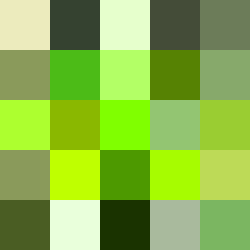 | |
| Hex triplet | #80FF00 |
| Source | On the RGB color wheel, Chartreuse is defined as the color halfway between yellow and green. |
| ISCC–NBS descriptor | Vivid yellowish green |
Definitions of chartreuse
Chartreuse (web color)
| Chartreuse (web color) | |
|---|---|
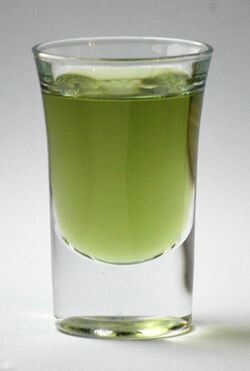 Green Chartreuse liqueur | |
| Hex triplet | #7FFF00 |
| Source | X11 |
| ISCC–NBS descriptor | Vivid yellowish green |
Chartreuse green was codified to refer to this brighter color when the X11 colors were formulated in 1987; by the early 1990s, they became known as the X11 web colors. The web color chartreuse is the color precisely halfway between green and yellow, so it is 50% green and 50% yellow. It is one of the tertiary colors of the HSV color wheel, also known as the RGB color wheel. Another name for this color is chartreuse green.[1]
The term chartreuse is defined by the Oxford English Dictionary as: "A shade of color; a pale apple-green". The dictionary gives a quotation in the British publication Western Daily Press (26 Dec. 1884) Vol. 7 No. 5 as being the earliest occurrence found in print of the term 'chartreuse' used as the name of a color. However the source does not define or describe the color referred to.[2]
"Chartreuse Green" is also listed in Plochere Color System (1948).[3]
In Color: Universal Language and Dictionary of Names (1976), "Chartreuse Green" is listed under "116. Brilliant Yellow Green".[4]
In The Domestic Monthly (1885) is written, "The delicate, pale green, with a yellow tinge, entitled 'Chartreuse,' is a rival to the renewed apple green," and, "The new shade of Chartreuse green, from light to dark, is lovely in the large feather fans. ... Some of the corded silks have fancy stripes in a combination of colors such as ... mousse and Chartreuse, which is the stylish yellow green."[5]
In The Ladies' Home Journal of May 1889, is written, "Chantilly cloaks come shaped like the old-fashioned rotonde, with collar of narrow lace, and are worn over a lining of chartreuse green or jonquil yellow."[6]
In The Millinery Trade Review (1889) is written, "From Madame Catlin of Paris, a hat of velvet in moss-green of medium tone, or of strong Chartreuse-green."[7]
In The Mineral Industry (1898) is written, "The characteristic twin colors of a few doubly refractive gems will prove of interest ... tourmaline green (chartreuse green and bluish green).[8]
In Dry Goods Reporter (1905), it is noted under "Choosing an Easter Hat" — "Chartreuse greens are among the colors hardest of all to combine artistically, and yet with the new popular bluet are charming."[9]
In Pure Products (1910) is written, "The following colors can be bought in powder form ... chartreuse green".[10]
In a 1956 edition of Billboard, a jukebox is advertised as being available in "Delft blue, cherry red, embered charcoal, chartreuse green, bright sand, canary yellow, atoll coral and night-sky black."[11]
In 1988, Margaret Walch, director of the Color Association of the United States is reported to have said, "The hottest color out there now is an ugly chartreuse green.... It suggests what we don't have: nature, youth, energy, growth."[12]
Chartreuse (traditional)
| Chartreuse (traditional) | |
|---|---|
| Hex triplet | #DFFF00 |
| Source | Maerz and Paul[13] |
| ISCC–NBS descriptor | Vivid yellowish green |

The first recorded use of chartreuse for the color that is now called chartreuse yellow in American English was in 1892.[14]
In the book Color Standards and Color Nomenclature (1912), "Chartreuse Yellow" is listed and illustrated.[15]
Variations of chartreuse
Yellow-green
| Yellow-green | |
|---|---|
| Hex triplet | #9ACD32 |
| Source | X11 |
| ISCC–NBS descriptor | Vivid yellow green |
Yellow-green is a dull medium shade of chartreuse. Before the X11 colors were formulated in 1987, the color term yellow-green was used to refer to the color that is now designated as the web color chartreuse (chartreuse green). Now, the term "yellow-green" is used to refer to this medium desaturated shade of chartreuse.
Green-yellow
| Green-yellow | |
|---|---|
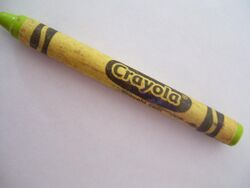 A Crayola green-yellow crayon | |
| Hex triplet | #ADFF2F |
| Source | X11[16] |
| ISCC–NBS descriptor | Vivid yellow green |
Green-yellow is a mixture of the colors green and yellow. It is a web color. It is a light tint of chartreuse.
"Green-yellow" is an official Crayola crayon color which was formulated in 1958.
Green-yellow is near the center of the light spectrum visible to the human eye, and is very eye-catching. For this reason, many emergency vehicles and uniforms exhibit green-yellow.
Lime
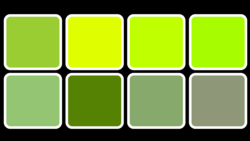
| Lime | |
|---|---|
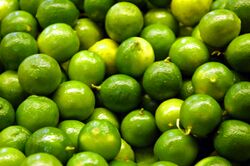 | |
| Hex triplet | #BFFF00 |
| Source | Maerz & Paul[17] |
| ISCC–NBS descriptor | Vivid yellow green |
Lime is a color that is sometimes referred to as a representation of the color of the citrus fruit called limes. However, in its original form, it referred to the color of the samara fruits of the lime or linden tree (species in the genus Tilia). The first recorded use of lime green as a color name in English was in 1890.[18][14]
Spring bud
| Spring bud | |
|---|---|
| Hex triplet | #A7FC00 |
| Source | Maerz and Paul[19] |
| ISCC–NBS descriptor | Vivid yellow green |
Spring bud was the color that was traditionally called "spring green" before the web color spring green was formulated in 1987.
The first recorded use of spring green as a color name in English (meaning the color that is now called spring bud) was in 1766.[20]
Pistachio
| Pistachio | |
|---|---|
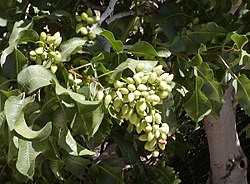 Ripening pistachio culinary nuts | |
| Hex triplet | #93C572 |
| sRGBB (r, g, b) | (147, 197, 114) |
| CMYKH (c, m, y, k) | (25, 0, 42, 23) |
| HSV (h, Saturation (color theory) | (96°, 42%, 77%) |
| Source | ISCC-NBS |
| ISCC–NBS descriptor | Strong yellow green |
| B: Normalized to [0–255] (byte) H: Normalized to [0–100] (hundred) | |
Pistachio is a dull yellowish-green color resembling the pistachio nut.
Avocado
| Avocado | |
|---|---|
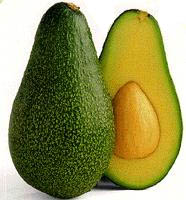 An avocado | |
| Hex triplet | #568203 |
| sRGBB (r, g, b) | (86, 130, 3) |
| CMYKH (c, m, y, k) | (34, 0, 98, 49) |
| HSV (h, Saturation (color theory) | (81°, 98%, 51%) |
| Source | Pourpre.com |
| ISCC–NBS descriptor | Deep yellow green |
| B: Normalized to [0–255] (byte) H: Normalized to [0–100] (hundred) | |
Avocado is a dark yellow-green color that is a representation of the color of the outer surface of an avocado.[21] Avocado, along with other earthy tones like harvest gold and burnt orange, was a common color for consumer goods like automobiles, shag carpets, and household appliances during the 1970s.[21]
Asparagus
| Asparagus | |
|---|---|
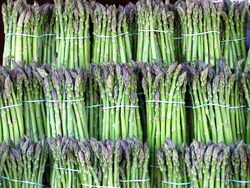 Bundled stalks of asparagus | |
| Hex triplet | #87A96B |
| sRGBB (r, g, b) | (135, 169, 107) |
| CMYKH (c, m, y, k) | (20, 0, 37, 34) |
| HSV (h, Saturation (color theory) | (93°, 37%, 66%) |
| Source | Crayola[citation needed] |
| ISCC–NBS descriptor | Moderate yellow green |
| B: Normalized to [0–255] (byte) H: Normalized to [0–100] (hundred) | |
Asparagus is a tone of chartreuse that is named after the vegetable. Crayola created this color in 1993 as one of the 16 to be named in the Name the Color Contest.
It is also the color of a wild asparagus plant blowing in the wind of the 1949 classic film Sands of Iwo Jima.
Another name for this color is asparagus green. The first recorded use of "asparagus green" as a color name in English was in 1805.[22]
Artichoke
| Artichoke | |
|---|---|
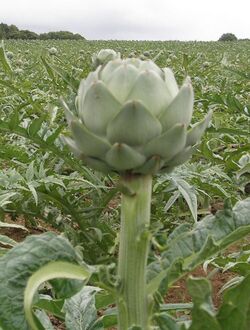 An artichoke | |
| Hex triplet | #8F9779 |
| sRGBB (r, g, b) | (143, 151, 121) |
| CMYKH (c, m, y, k) | (5, 0, 20, 41) |
| HSV (h, Saturation (color theory) | (76°, 20%, 59%) |
| Source | ISCC-NBS[23][24] |
| ISCC–NBS descriptor | Moderate yellow green |
| B: Normalized to [0–255] (byte) H: Normalized to [0–100] (hundred) | |
Artichoke is a color that is a representation of the color of a raw fresh uncooked artichoke. Another name for this color is artichoke chartreuse or artichoke green.
The first recorded use of "artichoke green" as a color name in English was in 1905.[24]
See also
- Lime (color)
- List of colors
References
- ↑ See the 1930s version of "Chartreuse green" in the index and color samples, a color not as green as the web color chartreuse, but greener than chartreuse yellow – actually it is a representation of the actual color of green chartreuse liqueur. The first recorded use of chartreuse green as a color name in English was in 1926 – Maerz and Paul A Dictionary of Color Page 192; Color sample of Chartreuse Green: Page 47 Plate 12 Color Sample L2
- ↑ The Oxford English Dictionary (Second ed.). 1989.
- ↑ Gladys and Gustav Plochere (Dec 15, 1948) Plochere Color System in Book Form, a Guide to Color and Color Harmony, Los Angeles OCLC 5033214
- ↑ Kenneth Low Kelly, Deane Brewster Judd (1976) Color: Universal Language and Dictionary of Names, p. 58, U.S. Department of Commerce, National Bureau of Standards; Template:LoC catalog record
- ↑ The Domestic Monthly: An Illustrated Magazine of Fashion, Literature, and the Domestic Arts (1885) Vol. 23, pp. 162, 237, 368, Blake and Company, New York
- ↑ "New Fashions" (May 1889) The Ladies' Home Journal, Vol. 6, No. 6, p. 14, Philadelphia
- ↑ The Millinery Trade Review (Sep 1889) Vol. 14, No. 9, p. 18
- ↑ "The Identification of Gems" (1898) The Mineral Industry, Vol. 7, p. 283, McGraw-Hill Book Company, New York and London
- ↑ "Latest Spring Millinery" (Apr 22, 1905) Dry Goods Reporter Vol. 35, No. 16 p. 33, Chicago
- ↑ "The Coloration of Liqueurs" (1910) Pure Products, Vol. 6, No. 1, p. 278, Scientific Station for Pure Products, New York
- ↑ Billboard (Mar 24, 1956) p. 85
- ↑ "Fashion Confusion" (June 20, 1988) New York Magazine, Vol. 21, No. 25
- ↑ The color displayed here matches the color called chartreuse in the 1930 book by Maerz and Paul A Dictionary of Color New York:1930 McGraw-Hill; the color chartreuse is displayed on page 45 Plate 11, Color Sample L1.
- ↑ 14.0 14.1 Aloys John Maerz; Morris Rea Paul (1930) A Dictionary of Color, p. 192, New York: McGraw-Hill
- ↑ Robert Ridgway (1912) Color Standards and Color Nomenclature, p. 67, Published by the author, Washington D.C. OCLC 630954
- ↑ "SVG Color Keywords, CSS3 Color Module, W3C Candidate Recommendation 14 May 2003". W3C. http://www.w3.org/TR/css3-color/#svg-color.
- ↑ Aloys John Maerz; Morris Rea Paul (1930) A Dictionary of Color, New York: McGraw-Hill; The index refers to Plate 20 Color Sample J1 as Lime Green; this color is shown on Plate 20 as being halfway between yellow-green (the old name for the color that is now called chartreuse green) and yellow on the color wheel.
- ↑ The Daily News (London) 14 July 1890. "lime, n2.". Oxford English Dictionary online version. Oxford University Press. September 2011. http://www.oed.com/view/Entry/108433?rskey=QODUjt&result=2&isAdvanced=false#eid116686059. (subscription or UK public library membership required)
- ↑ The color displayed here matches the color called spring green in the 1930 book by Maerz and Paul A Dictionary of Color New York:1930 McGraw-Hill; the color spring green is displayed on page 59, Plate 18, Color Sample J7.
- ↑ Maerz and Paul A Dictionary of Color New York:1930 McGraw-Hill p. 205; Color Sample of Spring Green: p. 59 Plate 18 Color Sample J7
- ↑ 21.0 21.1 St. Clair, Kassia (2016). The Secret Lives of color. London: John Murray. pp. 230–231. ISBN 9781473630819. OCLC 936144129.
- ↑ Maerz and Paul A Dictionary of Color New York:1930 McGraw-Hill p. 189
- ↑ "Retsof online version of ISCC-NBS Dictionary of Colo(u)r Names – Aa through Az". 26 December 2012. http://tx4.us/nbs/nbs-a.htm.
- ↑ 24.0 24.1 Maerz and Paul A Dictionary of Color New York:1930 McGraw-Hill p. 189; Color Sample of Artichoke Green: p. 63 Plate 20 Color Sample B2
External links
 |
 KSF
KSF
